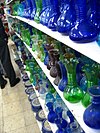Palestine, officially the State of Palestine, is a country in the southern Levant region of West Asia recognized by 146 out of 193 UN member states. It encompasses the Israeli-occupied West Bank, including East Jerusalem, and the Gaza Strip, collectively known as the occupied Palestinian territories, within the broader geographic and historical Palestine region. Palestine shares most of its borders with Israel, and it borders Jordan to the east and Egypt to the southwest. It has a total land area of 6,020 square kilometres (2,320 sq mi) while its population exceeds five million people. Its proclaimed capital is Jerusalem, while Ramallah serves as its administrative center. Gaza City was its largest city prior to evacuations in 2023.
Situated at a continental crossroad, the region of Palestine was ruled by various empires and experienced various demographic changes from antiquity to the modern era. Being a bridge between Asia and Africa, it was treading ground for the Nile and Mesopotamian armies and merchants from North Africa, China and India. The region is known for its religious significance. The ongoing Israeli–Palestinian conflict dates back to the rise of the Zionist movement, supported by the United Kingdom during World War I. The war saw Britain occupying Palestine from the Ottoman Empire, where it set up Mandatory Palestine under the auspices of the League of Nations. During this period, large-scale Jewish immigration allowed by the British authorities led to increased tensions and violence with the local Palestinian Arab population. In 1947, Britain handed the issue to the United Nations, which proposed a partition plan, for two independent Arab and Jewish states and an independent entity for Jerusalem, but a civil war broke out, and the plan was not implemented.
The 1948 Palestine war saw the forcible displacement of most of its predominantly Arab population, and consequently the establishment of Israel, in what Palestinians call the Nakba. In the Six-Day War in 1967, Israel occupied the West Bank and the Gaza Strip, which had been held by Jordan and Egypt respectively. The Palestine Liberation Organization (PLO) declared independence in 1988. In 1993, the PLO signed the Oslo peace accords with Israel, creating limited PLO governance in the West Bank and Gaza Strip through the Palestinian Authority (PA). Israel withdrew from Gaza in its unilateral disengagement in 2005, but the territory is still considered to be under military occupation and has been blockaded by Israel. In 2007, internal divisions between political factions led to a takeover of Gaza by Hamas. Since then, the West Bank has been governed in part by the Fatah-led PA, while the Gaza Strip has remained under the control of Hamas. Israel has constructed large settlements in the occupied West Bank and East Jerusalem since 1967, where currently more than 670,000 Israeli settlers, which are illegal under international law.
Currently, the biggest challenges to the country include ineffective government, Israeli occupation, Islamist factions, a blockade, restrictions on movement, Israeli settlements and settler violence, as well as an overall poor security situation. The questions of Palestine's borders, the legal and diplomatic status of Jerusalem, and the right of return of Palestinian refugees remain unsolved. Despite these challenges, the country maintains an emerging economy and sees frequent tourism. Arabic is the official language of the country. While the majority of Palestinians practice Islam, Christianity also has a presence. Palestine is also a member of several international organizations, including the Arab League and the Organization of Islamic Cooperation. It has been a non-member observer state of the United Nations since 2012.[excessive citations] (Full article...)

Hebron glass (Arabic: زجاج الخليل, zajaj al-Khalili or azaz al-Khalili) refers to glass produced in Hebron as part of a flourishing art industry established in the city during Roman rule in Palestine. Hebron's Old City still contains a quarter named the "Glass-Blower Quarter" and Hebron glass continues to serve as a tourist attraction for the city. Traditionally, the glass was melted using local raw materials, including sand from neighbouring villages, sodium carbonate (from the Dead Sea), and coloring additives such as iron oxide and copper oxide. Nowadays, recycled glass is often used instead. Glass production in Hebron is a family trade, the secrets of which have been preserved and passed down by a few Palestinian families who operate the glass factories located just outside the city. The products made include glass jewellery, such as beads, bracelets, and rings, as well as stained glass windows, and glass lamps. However, due to the Palestinian-Israeli conflict, glass production has suffered a decline.
| Both the Germans and the Zionists wanted as many Jews as possible to move to Palestine. The Germans preferred to have them out of Western Europe, and the Zionists themselves wanted the Jews in Palestine to outnumber the Arabs as quickly as possible. (...) In both cases, the purpose was a kind of 'ethnic cleansing', that is, a violent change in the ratio of ethnic groups in the population.
|